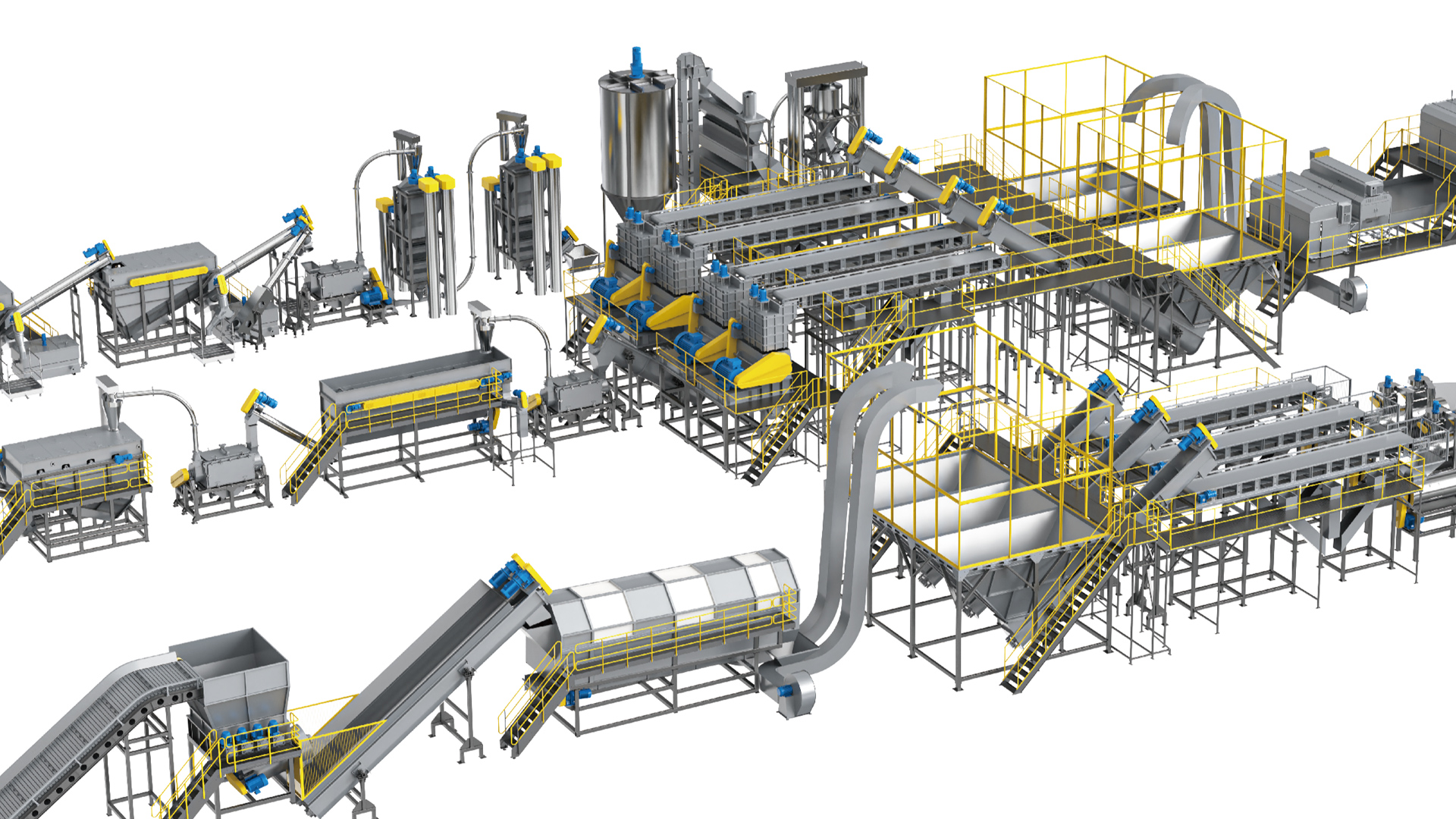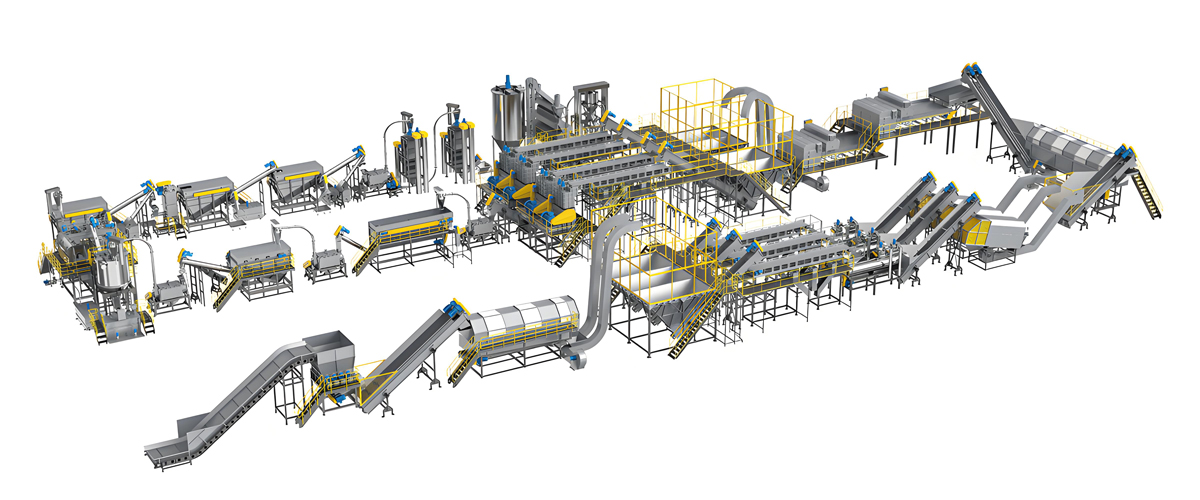A plastic recycling machine is a device specifically designed for processing waste plastics. It can reprocess waste plastics to restore their useful value. These machines separate plastics from various waste through a series of complex physical and chemical processes, and then perform operations such as cleaning, crushing, melting, and re granulation.
Collection and Preliminary Treatment of Plastic Waste
Sorting process
In the initial stage of plastic waste recycling, plastic recycling machines can assist manual sorting. For example, through technologies such as optical sensors, recycling machines can identify the general categories of different plastic materials, such as distinguishing common plastics such as polyethylene (PE), polypropylene (PP), and polyvinyl chloride (PVC). This helps to classify and place different types of plastics, as the recycling and reuse methods for different plastics vary.
For plastic waste mixed with other impurities such as metal, glass, paper, etc., recycling machines can use magnetic separation, air separation, and other methods to remove metals and light impurities. For example, in the wind sorting device, lightweight materials such as plastic and paper are used to separate heavier glass and metal in different motion states in the airflow, thereby improving the purity of plastic waste.
Crushing treatment
The crushing unit of the plastic recycling machine can crush plastic waste of different shapes and sizes, such as large plastic containers, plastic pipes, plastic films, etc., into smaller fragments. For example, crushing discarded plastic buckets into fragments several centimeters in size facilitates subsequent cleaning, melting, and other processing steps. Moreover, the broken plastic fragments have a larger specific surface area, which is conducive to the removal of impurities and the action of chemical agents during the cleaning process.
Some advanced plastic recycling machines can also adjust the degree of crushing as needed. For example, in situations where high-quality recycled plastic pellets need to be manufactured, the plastic can be crushed finer to better control the quality and performance of the recycled plastic.
Cleaning and purification
The cleaning system in the plastic recycling machine uses various cleaning methods to process the broken plastic. For example, using a combination of mechanical stirring and high-pressure water gun flushing to remove dirt, oil stains, label adhesives, and other impurities from the surface of plastic fragments. For plastic waste with severe pollution, appropriate cleaning agents can be added to improve the cleaning effect.
During the cleaning process, the recycling machine can remove impurities from the cleaning water through a filtering device, achieving the recycling of the cleaning water and reducing the waste of water resources. At the same time, the cleaned plastic fragments will be transported to a drying unit to remove moisture through methods such as hot air blowing or centrifugal dehydration, preparing for subsequent processing.
Recycling and processing of plastic waste
Melting and Forming
After cleaning and drying, the plastic fragments will be transported to the melting unit of the recycling machine. In this unit, plastic fragments are melted by heating devices based on the melting points of different plastics. For example, PET (polyethylene terephthalate) plastic typically melts at around 250-260 ℃, while PP (polypropylene) plastic melts at around 160-170 ℃.
The melted plastic can be molded using equipment such as extruders or injection molding machines. Extruders can extrude melted plastic into plastic strips or filaments, which are used to manufacture products such as plastic fibers and plastic pipes; Injection molding machines can inject melted plastic into molds to manufacture various plastic parts, such as plastic toys, plastic stationery, etc.
Granulation process
The plastic recycling machine can also turn melted plastic into recycled plastic pellets. This is a common form of plastic recycling, as recycled plastic pellets can be conveniently used as raw materials for the production of various plastic products. During the granulation process, the melted plastic is extruded through a special mold and then subjected to cooling, cutting, and other processes to form uniform plastic particles. The size and shape of these particles can be adjusted according to actual needs, for example, the common diameter of recycled plastic particles is around 2-5 millimeters.
Recycled plastic particles after granulation can undergo quality testing to ensure that their physical properties such as density, hardness, and toughness meet relevant quality standards for subsequent plastic product production.
Quality monitoring and improvement
Quality inspection system
The plastic recycling machine is equipped with various quality inspection equipment to monitor the quality of plastic waste during the recycling process. For example, using an online spectrometer can detect the composition and impurity content of plastics, ensuring the purity of recycled plastics. During the granulation stage, the particle size detection equipment can monitor in real-time whether the size of recycled plastic particles is uniform, and promptly detect and solve possible quality problems.
For the performance testing of recycled plastics, recycling machines can use equipment such as tensile tests and impact tests to test their mechanical properties. If it is found that the performance of recycled plastic does not meet the requirements, such as insufficient toughness or strength, its performance can be improved by adjusting the processing parameters of the recycling machine (such as adding modifiers, adjusting melting temperature, etc.).
Product quality improvement
The quality monitoring and adjustment function of the plastic recycling machine can effectively improve the quality of recycled plastic products. For example, in the production of recycled plastic fibers, by precisely controlling the processing parameters of the recycling machine, the strength and uniformity of the fibers can be improved, making them suitable for higher quality textile products. Moreover, high-quality recycled plastic products can enhance their competitiveness in the market and promote the healthy development of the plastic waste recycling industry.






